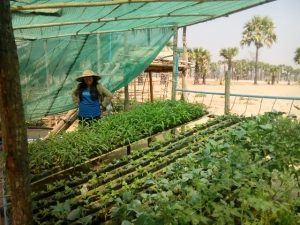Q&A: Next Decade Sufficient Time for a Food Revolution
 30 November 2020
30 November 2020

Protecting and improving food systems will be vital to reduce the risk of people falling into food insecurity, the United Nations says. Credit: Sara Perria/IPS
By IPS Correspondents
BONN, Germany/BULAWAYO, Zimbabwe, Nov 30 2020 (IPS)
In March, after the World Health Organisation first declared COVID-19 a pandemic, the World Food Programme (WFP) of the United Nations activated a global corporate emergency mechanism for the first time. It had already written to all donor countries asking for $1.9 billion in front-loaded funding, and had begun emergency procurement. Its priority was to sustain life-saving assistance first.
And as the world’s countries began unprecedented nationwide shutdowns, including international travel bans, the closure of schools, shops, and indirect restrictions on local transport and food supply chains, WFP aimed to keep open transport corridors for passenger and cargo movement.
The U.N. agency, which won the 2020 Nobel Peace Prize for its response, had already estimated that some 270 million people — increased from 135 million pre-COVID-19 — would become acutely food insecure if not assisted. In addition, 690 million people do not have enough to eat.
But responding to the development emergency, WFP noted that in addition the pandemic was placing significant stress on existing food systems.
Protecting and improving food systems would be vital to reduce the risk of people falling into food insecurity and will enable “quicker and more inclusive recovery”, the agency noted.
Addressing “the impending global food emergency and avoid the worst impacts of the pandemic, while seizing upon the opportunity of resetting food systems,” is a focus of the upcoming online dialogue, ‘Resetting the Food System from Farm to Fork’, which will be hosted by the Barilla Centre for Food and Nutrition (BCFN) and Food Tank on Dec. 1.
“The current crisis is showing us we went wrong somewhere along the way. We need to rethink the whole food system to move forward,” said Edie Mukiibi, Vice President, Slow Food International and participant in the event.

Chair of the Barilla Group and BCFN, Guido Barilla. Courtesy: Barilla Group
Chair of the Barilla Group and BCFN, Guido Barilla, believes that resetting food systems is possible in less than a decade: “We need a positive movement to accelerate, empower, refine, and design a more sustainable future, and raising awareness in people – companies, citizens, institutions- that another future is possible.”
“If there’s one thing the current situation has taught me is that no one wins alone and that it is necessary to build new powerful alliances,” Barilla said, adding, “Another very important aspect is related to the individual commitment of each and every one of us.”
Danielle Nierenberg, a food systems advocate and founder of Food Tank, a U.S. think tank for food, said that in doing this smallholder farmers play a key role as well.
“We need farmers in decision making roles and policies that affect them whether it is dealing with the pandemic, climate crisis or how to create more equity in the food system, especially for women and girls.
“We need participatory research where farmers work with economists, researchers and extension workers to do the research that will help them improve yields or develop their practices and use different kind of technologies. Innovations are not often taken up because farmers are not involved in them,” Nierenberg told IPS.
Excerpts of the interview with Barilla follow:
Inter Press Service (IPS): In light of the COVID-19 pandemic and the further strain it has placed on the the global food system, how can we move forward to ensure that the world’s people are fed in a sustainable way?
Guido Barilla (GB): The COVID-19 pandemic shows just how interconnected we all are, not only with each other but also to the planet itself. This crisis is the latest example of the increasing pressure and expectations being put on the world’s food system – not only to keep us all fed, but to ensure we are well nourished and to do so while looking after the environment, tackling the climate crisis, and ensuring people’s livelihoods continue to be met.
Faced with this situation, we must have the courage to change – agri-food companies, retailers, institutions, chef, citizens – because there is no alternative to sustainability. We need to make radical choices and today we are here to build a truly transformative agenda for a sustainable and equitable future (contributing with our ideas and recommendations to the 2021 United Nations Food Systems Summit).
IPS: We only have 10 years to reach the United Nations 2030 Agenda. Is this enough time to change global food systems? And how can we do it in the aftermath of the COVID-19 pandemic?
GB: From my point of view, 10 years is rather long enough to generate a revolution, and the next 5 years will be crucial. If there’s one thing the current situation has taught me is that no one wins alone and that it is necessary to build new powerful alliances:
- between the generations, to find a common language and common objectives to pursue;
- among the actors along the agri-food chain, to find joint solutions to build a truly regenerative, restorative, and resilient food system;
- between rich and poor countries to call Governments for a global partnership for agriculture, food security and nutrition in order to promote better coordinated and coherent global action;
- between civil society and private sector, to never lose sight of people’s real needs.
The post Q&A: Next Decade Sufficient Time for a Food Revolution appeared first on Inter Press Service.
